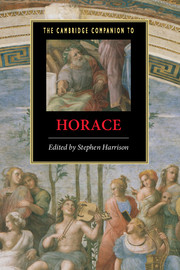Book contents
- Frontmatter
- Introduction
- Part 1: Orientations
- Part 2: Poetic Genres
- Part 3: Poetic Themes
- Part 4: Receptions
- 20 Ancient receptions of Horace
- 21 The reception of Horace in the Middle Ages
- 22 The reception of Horace in the Renaissance
- 23 The reception of Horace in the seventeenth and eighteenth centuries
- 24 The reception of Horace in the nineteenth and twentieth centuries
- Dateline of works and major political events
- Works cited
- Index
23 - The reception of Horace in the seventeenth and eighteenth centuries
from Part 4: - Receptions
Published online by Cambridge University Press: 28 May 2007
- Frontmatter
- Introduction
- Part 1: Orientations
- Part 2: Poetic Genres
- Part 3: Poetic Themes
- Part 4: Receptions
- 20 Ancient receptions of Horace
- 21 The reception of Horace in the Middle Ages
- 22 The reception of Horace in the Renaissance
- 23 The reception of Horace in the seventeenth and eighteenth centuries
- 24 The reception of Horace in the nineteenth and twentieth centuries
- Dateline of works and major political events
- Works cited
- Index
Summary
At the start of our period, in 1601, Ben Jonson identified himself with Horace, in Poetaster; exactly 200 years later, in a soil barely scratched by Elizabethan adventurers, an anonymous author in Philadelphia’s Port Folio Magazine chose to translate a sonnet of Charlotte Smith, the English Romantic, into five stanzas of Horatian Sapphics. Between those two moments - one celebrated, one obscure - lies a vast, disparate mixture of receptions. The central part of our period is often called the 'Augustan Age' - sometimes a contentious term: to what extent is it a Horatian age? It is not always profitable to try to distinguish specifically Horatian attitudes from a more general and pervasive neo-classical culture. The concept of politeness was to become influential, alongside the ideal of retirement from urban chaos; for Alexander Pope, as for Jonson, Horace was a means of self-fashioning. Both moralists and libertines could seek instruction in his works. Neo-Latin, alongside many vernaculars, continued as a medium of creative imitation. There follows a series of snapshots, from Britain and beyond, to illustrate at least some aspects of our poet’s extraordinary cultural impact.
Translating, reading and editing
John Ashmore, in 1621, was the first to publish a selection of Horace’s odes in English. He translated 17 of them (3.9 three times). Sir T[homas] H[awkins], in 1625, ‘had rather teach Vertue to the modest, th[a]n discover Vice to the dissolute . . . [and not] take unhappy draughts, from the troubled and muddy waters of Sensuality’. Hawkins admits the ‘lesse morall’ 3.9 with reluctance, and only ‘for Iul. Scaliger’s sake, who much admireth it’.
- Type
- Chapter
- Information
- The Cambridge Companion to Horace , pp. 318 - 333Publisher: Cambridge University PressPrint publication year: 2007
- 3
- Cited by



